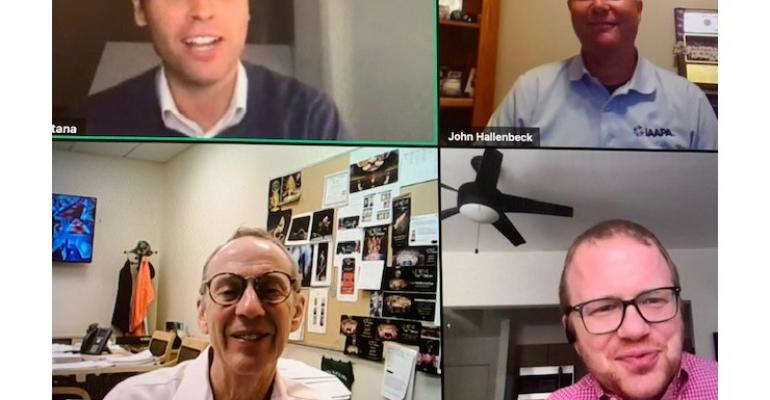How will performers interact? Is this the end of big musicals? What about audience seating? Could there even be intimate venues like nightclubs?
What if a script calls for kissing?
So many questions and considerations.
A panel of entertainment and attractions experts shared their insights and experiences so far in a live Seatrade Cruise Talks webinar Thursday.
When to require masks?
Communication is really important, said Rick Gray, GM of entertainment operations, Wynn Las Vegas, which has just reopened. Employees and guests want and need to understand sanitation protocols and new practices, such as when masks are required. At Wynn, spa-goers and show audiences should wear them.
Smile brigade
But there's a hospitable way to guide guests, not inundate them with rules. A Wynn 'smile brigade' circulates to politely ensure distancing.
Crowding is also eased by making many things by appointment —pool, gym and spa use, for examples.
Each company and jurisdiction has different rules, according to John Hallenbeck, VP and executive director, IAAPA North America. Universal Orlando, for example, mandates masks, but also provides places where people can remove them to cool off, as long as they maintain distance.
Attractions guidance
IAAPA, the global association for the attractions industry, is making its 36-page reopening guidance for attractions available to anyone, free, on its website.
Open-air entertainment is much safer than enclosed venues, and pool shows are OK because chlorine kills the virus.
Nightclubs are another matter — Nevada currently prohibits them, Gray said.
Venue layout and seating
Figuring out new venue design in Broadway's landmark theaters is a challenge, according to Ryan Murphy, VP and production manager, Aurora Productions. A large number of seats will have to be taken out, and entrance and egress will be controlled, including the paths to touch-free hand sanitizers.
'The biggest challenge is a traditional theater situation,' Gray agreed. He said people can't sit close to the stage, with vocalists' saliva aerosolized into the first 10 rows. Wynn plans is to seat people in every other row, with three seats between parties. Capacity will be reduced about 25%.
And in all the talk about technology to address COVID-19, wouldn't it be great if someone came up with a program to optimize venue seating?
Lots of policies and procedures are in place for performers and crews, all the webinar experts said.
Performer safety
'Performer safety is a huge concern,' according to Murphy. So, on Broadway, the use of fogging and sanitation measures is being scrutinized. Personal protective equipment will be required for stage crew, along with temperature checks and regular testing. Some props and materials can be cleaned with UVC lighting although there's evidence that may cause long-term degradation.
'Personal diligence is important. Wardrobe crew will need to wash their hands constantly,' he said.
Wynn Las Vegas mandated all employees be tested for the virus, but not for antibodies since that's not reliable yet. When it comes to shows, cast members 'have to respect each other and follow protocols,' Gray said.
The 'illusion of touch'
Kissing and other close contact in shows will have to be avoided, but how?
Webinar moderator Ryan Stana, CEO, RWS Entertainment Group, said a client recently put 'the illusion of touch,' into a contract.
If someone in a cast were to get sick, the show would need to shut down, Gray said. So policies like paid sick days are important because 'the biggest issue in getting people to stay home is that they can't afford it.'
Many attractions are breaking down crews into A, B and C staffs, who work different shifts, Hallenbeck said. That reduces the chance of outbreak spreading.
Copyright © 2024. All rights reserved. Seatrade, a trading name of Informa Markets (UK) Limited.
Add Seatrade Cruise News to your Google News feed.  |

